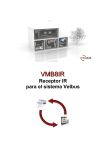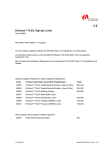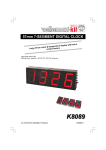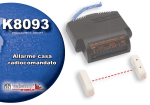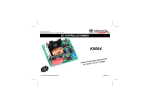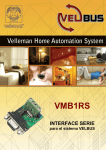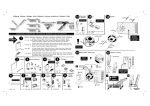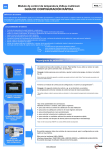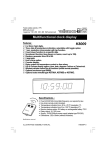Download Manual - Velleman
Transcript
Total solder points: 77 Difficulty level: beginner 1 2 3 4 5 advanced OPTICAL PROXIMITY SWITCH K8092 of unit ct in front je b o r o d an y waving h Operate b ILLUSTRATED ASSEMBLY MANUAL Total solder points: 77 Difficulty level: beginner 1 2 3 4 5 H8092IP-1 advanced OPTICAL PROXIMITY SWITCH K8092 front or object in d n a h g in y wav Operate b ILLUSTRATED ASSEMBLY MANUAL of unit H8092IP-1 Features & Specifications Features: small and compact unit operate output relay by waving hand or object in front of unit no touching required adjustable sensitivity status led indicators momentary (pulse) or toggle (ON/OFF) mode Perfectly suited for our Velbus system and our K8006 home bus system Use for detection in DIY projects (not suited for very dark object detection) Comes complete with snap-in enclosure. Type VMBFBI fits Velleman VMBFDG and VMBFLG frames Specifications: power supply: max. 12VDC/100mA output relay rating: 3A/24VDC LED indication dimensions (wxhxd): 21x47x41mm / 0.8x1.85x1.6" 2 Features & Specifications Features: small and compact unit operate output relay by waving hand or object in front of unit no touching required adjustable sensitivity status led indicators momentary (pulse) or toggle (ON/OFF) mode Perfectly suited for our Velbus system and our K8006 home bus system Use for detection in DIY projects (not suited for very dark object detection) Comes complete with snap-in enclosure. Type VMBFBI fits Velleman VMBFDG and VMBFLG frames Specifications: power supply: max. 12VDC/100mA output relay rating: 3A/24VDC LED indication dimensions (wxhxd): 21x47x41mm / 0.8x1.85x1.6" 2 Assembly hints 1. Assembly (Skipping this can lead to troubles ! ) Ok, so we have your attention. These hints will help you to make this project successful. Read them carefully. 1.1 Make sure you have the right tools: • A good quality soldering iron (25-40W) with a small tip. • Wipe it often on a wet sponge or cloth, to keep it clean; then apply solder to the tip, to give it a wet look. This is called ‘thinning’ and will protect the tip, and enables you to make good connections. When solder rolls off the tip, it needs cleaning. • Thin raisin-core solder. Do not use any flux or grease. • A diagonal cutter to trim excess wires. To avoid injury when cutting excess leads, hold the lead so they cannot fly towards the eyes. • Needle nose pliers, for bending leads, or to hold components in place. • Small blade and Phillips screwdrivers. A basic range is fine. 0.0 00 For some projects, a basic multi-meter is required, or might be handy 1.2 Assembly Hints : ⇒ ⇒ ⇒ ⇒ ⇒ ⇒ ⇒ ⇒ Make sure the skill level matches your experience, to avoid disappointments. Follow the instructions carefully. Read and understand the entire step before you perform each operation. Perform the assembly in the correct order as stated in this manual Position all parts on the PCB (Printed Circuit Board) as shown on the drawings. Values on the circuit diagram are subject to changes. Values in this assembly guide are correct* Use the check-boxes to mark your progress. Please read the included information on safety and customer service * Typographical inaccuracies excluded. Always look for possible last minute manual updates, indicated as ‘NOTE’ on a separate leaflet. 3 Assembly hints 1. Assembly (Skipping this can lead to troubles ! ) Ok, so we have your attention. These hints will help you to make this project successful. Read them carefully. 1.1 Make sure you have the right tools: • A good quality soldering iron (25-40W) with a small tip. • Wipe it often on a wet sponge or cloth, to keep it clean; then apply solder to the tip, to give it a wet look. This is called ‘thinning’ and will protect the tip, and enables you to make good connections. When solder rolls off the tip, it needs cleaning. • Thin raisin-core solder. Do not use any flux or grease. • A diagonal cutter to trim excess wires. To avoid injury when cutting excess leads, hold the lead so they cannot fly towards the eyes. • Needle nose pliers, for bending leads, or to hold components in place. • Small blade and Phillips screwdrivers. A basic range is fine. 0.0 00 For some projects, a basic multi-meter is required, or might be handy 1.2 Assembly Hints : ⇒ ⇒ ⇒ ⇒ ⇒ ⇒ ⇒ ⇒ Make sure the skill level matches your experience, to avoid disappointments. Follow the instructions carefully. Read and understand the entire step before you perform each operation. Perform the assembly in the correct order as stated in this manual Position all parts on the PCB (Printed Circuit Board) as shown on the drawings. Values on the circuit diagram are subject to changes. Values in this assembly guide are correct* Use the check-boxes to mark your progress. Please read the included information on safety and customer service * Typographical inaccuracies excluded. Always look for possible last minute manual updates, indicated as ‘NOTE’ on a separate leaflet. 3 Assembly hints 1.3 Soldering Hints : 1- Mount the component against the PCB surface and carefully solder the leads 2- Make sure the solder joints are cone-shaped and shiny 3- Trim excess leads as close as possible to the solder joint REMOVE THEM FROM THE TAPE ONE AT A TIME ! AXIAL COMPONENTS ARE TAPED IN THE CORRECT MOUNTING SEQUENCE ! 4 Assembly hints 1.3 Soldering Hints : 1- Mount the component against the PCB surface and carefully solder the leads 2- Make sure the solder joints are cone-shaped and shiny 3- Trim excess leads as close as possible to the solder joint REMOVE THEM FROM THE TAPE ONE AT A TIME ! AXIAL COMPONENTS ARE TAPED IN THE CORRECT MOUNTING SEQUENCE ! 4 Construction 1. Diode. Watch the polarity! 3. Crystal. D2 : 1N4148 2. Resistors 4. Push button : : : : : 7. Capacitors. SW1 : mode R... 1/8W: R3 R4 R5 R7 R8 IC1 : 8p X1 : 20MHz D... CATHODE 6. IC socket. Watch the position of the notch! 33K 2K2 2K2 2K2 220 (3 - 3 - 3 - B) (2 - 2 - 2 - B) (2 - 2 - 2 - B) (2 - 2 - 2 - B) (2 - 2 - 1 - B) Metalfilm 1/2W: R2 : 68 (6 - 8 - 0 - B - 9) 5. LED. Watch the polarity! LD1 : 3mm RED COLOUR=2...5 CATHODE C... C1 : 22pF C2 : 22pF (22) (22) C4 : 100nF (104) C5 : 100nF (104) C6 : 470nF (474) CATHODE LD... 5 Construction 1. Diode. Watch the polarity! 3. Crystal. D2 : 1N4148 2. Resistors 4. Push button : : : : : 33K 2K2 2K2 2K2 220 7. Capacitors. SW1 : mode R... 1/8W: R3 R4 R5 R7 R8 IC1 : 8p X1 : 20MHz D... CATHODE 6. IC socket. Watch the position of the notch! (3 - 3 - 3 - B) (2 - 2 - 2 - B) (2 - 2 - 2 - B) (2 - 2 - 2 - B) (2 - 2 - 1 - B) Metalfilm 1/2W: R2 : 68 (6 - 8 - 0 - B - 9) 5. LED. Watch the polarity! LD1 : 3mm RED COLOUR=2...5 CATHODE C... C1 : 22pF C2 : 22pF (22) (22) C4 : 100nF (104) C5 : 100nF (104) C6 : 470nF (474) CATHODE LD... 5 construction 8. Transistors 10. LED. Watch the polarity! T1 : BC547B Spacer LD2 : 3mm (Yellow) NOK T2 : BC337 OK 11. Infrared diode. Watch the polarity! 12. Diode. Watch the polarity! D1 : 1N4007 Make sure that transistor T2 is bent towards the PCB. LD1 CATHODE 9. Voltage regulator 13. Vertical resistor (metal film) VR1 : UA78L05 R... VR... Spacer LD4 : 3mm infrared diode (blue) R1 : 100 (1 - 0 - 1 - B - 9) R6 : 22 (2 - 2 - 0 - B - 9) 6 construction 8. Transistors 10. LED. Watch the polarity! T1 : BC547B Spacer LD2 : 3mm (Yellow) NOK T2 : BC337 OK 11. Infrared diode. Watch the polarity! 12. Diode. Watch the polarity! D1 : 1N4007 Make sure that transistor T2 is bent towards the PCB. LD1 CATHODE 9. Voltage regulator 13. Vertical resistor (metal film) VR1 : UA78L05 R... VR... Spacer LD4 : 3mm infrared diode (blue) 6 R1 : 100 (1 - 0 - 1 - B - 9) R6 : 22 (2 - 2 - 0 - B - 9) Construction 14. IR - demodulator 19. LED. Watch the polarity! 17. Relay LD3 : 3mm (red) 3 +V OUT GND 1 2 RY... 12 3 IRX1 : 38KHz/600µs (BRM-1040) 15. Electrolytic Capacitor. Watch the polarity ! RY1 18. Terminal block C3 : 100µF / 25V Mount LD3 if used with Velbus VMB8PB. 20. IC. Watch the position of the notch! C... 16. Trimmer RV... RV1 : 1K IC1 : VK8092 SK1 : 2p 'power supply' SK2 : 2p 'output relay' (programmed PIC12F629) 7 Construction 14. IR - demodulator 19. LED. Watch the polarity! 17. Relay LD3 : 3mm (red) 3 +V OUT GND 1 2 RY... 12 3 IRX1 : 38KHz/600µs (BRM-1040) 15. Electrolytic Capacitor. Watch the polarity ! RY1 18. Terminal block C3 : 100µF / 25V Mount LD3 if used with Velbus VMB8PB. 20. IC. Watch the position of the notch! C... 16. Trimmer RV... RV1 : 1K IC1 : VK8092 SK1 : 2p 'power supply' SK2 : 2p 'output relay' (programmed PIC12F629) 7 Connection Connection Stand alone With velbus system L 230V ~ 50/60Hz VMB3PS N + K8092 - + - 1 ... 8 12VDC VMBTR1 VMB8PB COM 12VAC 50VA DO NOT MOUNT LD3 MOUNT LD3 IF USED WITH VELBUS VMB8PB. 8 Connection Connection Stand alone With velbus system L 230V ~ 50/60Hz VMB3PS N + K8092 - + 12VDC VMBTR1 - 1 ... 8 VMB8PB 12VAC 50VA DO NOT MOUNT LD3 8 MOUNT LD3 IF USED WITH VELBUS VMB8PB. COM enclosure & control Mounting in enclosure VMBFBI B A Click the cover of the housing onto the enclosure Slide the PCB into the slot of the housing. Make sure that the connection side of the kit is slid in first. Control The relay is in pulse mode by default. LD2 will flash once to visually confirm you the mode and operation. When toggle mode is desired follow these steps to change the relay mode: 1. Hold push button SW1 pressed when power is disconnected. 2. Connect the power but keep push button SW1 pressed. LD2 will confirm by blinking twice. Release button. Repeat this function if you want to change the mode from toggle to pulse mode. Turn trimmer RV1 to the right to increase the infrared remote sensitivity; turn to the left to decrease the sensitivity. 9 enclosure & control Mounting in enclosure VMBFBI B A Click the cover of the housing onto the enclosure Slide the PCB into the slot of the housing. Make sure that the connection side of the kit is slid in first. Control The relay is in pulse mode by default. LD2 will flash once to visually confirm you the mode and operation. When toggle mode is desired follow these steps to change the relay mode: 1. Hold push button SW1 pressed when power is disconnected. 2. Connect the power but keep push button SW1 pressed. LD2 will confirm by blinking twice. Release button. Repeat this function if you want to change the mode from toggle to pulse mode. Turn trimmer RV1 to the right to increase the infrared remote sensitivity; turn to the left to decrease the sensitivity. 9 Schematic diagram Schematic diagram. 10 Schematic diagram Schematic diagram. 10 PCB PCB 11 PCB PCB 11 Modifications and typographical errors reserved © Velleman nv. H8092IP'1 - 2009 (version2) VELLEMAN NV Legen Heirweg 33, 9890 Gavere Belgium - Europe 5 410329 417222 Modifications and typographical errors reserved © Velleman nv. H8092IP'1 - 2009 (version2) VELLEMAN NV Legen Heirweg 33, 9890 Gavere Belgium - Europe 5 410329 417222












